Today, we will review 5 penetration-level
graphics cards, the products showing up at an acceptable pricing, including 1
original model from Nvidia, 3 GeForce GTX 650 Ti priority products of ECGA,
Gigabyte, Zotac and Zotac GeForce GT 640. What does this price range offer us
today? Let’s find out!
The graphics card family having the price
from 100$ to 200$ is known as the products that meet the highest demand of the
users. Representing for these current generations of product are the Radeon HD
7850 and HD 7870 line of AMD and GeForce GTX 660 and 660 Ti of Nvidia, they
support all cutting-edge techs and are able to reach the moderate performance
for the latest 3D game apps. However, not all users need such performance, so
they are looking for the simpler and cheaper solutions.
They are Radeon HD 7770 and HD 7750 of AMD we
tested earlier and the recently released Nvidia GeForce GTX 650 Ti. It is the
last product we will mention in this review. Apart from the original GeForce
GTX 650 Ti version, we also take 3 different models from EVGA, Gigabyte and
Zotac. We will also take GeForce GT 640 of Zotac into account, the product that
officially positioned at low-end gaming-graphics card segment, equipped with
GPU Nvidia.
Products participating in the tests
Nvidia
GeForce GTX 650 Ti 1GB
We realize that Nvidia GeForce GTX 650 Ti doesn’t
have any packing except for an anti-static packing. The product looks humble,
only 145-mm long.
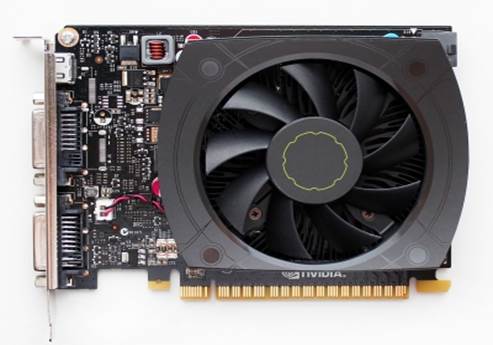
Nvidia
GeForce GTX 650 Ti 1GB
The black PCB (Printed circuit board) looks
perfect on the black plastic coating of the cooler. The later-generation products
seem to be bigger, but it’s just an illustration because this PCB maybe the
smallest among the graphics card for gaming.
Nvidia GeForce GTX 650 Ti 1GB is equipped
with 2 dual-link DVI ports and a HDMI 1.4a mini port.

DVI
and HDMI ports
We can see a standard 6-pin power connector
located at its normal position:

Charger
connector
According to the announced technical
standards, Nvidia GeForce GTX 650 Ti consumes a maximum of 110 watts. A
computer with such graphics card is encouraged to have 400-watt or higher PSU. The
products in this segment lack SLI connector.
The PCB is extremely simplified with the
feature of which is a 3-phrase power system with 2 phrases for the GPU and one
for the memory chipset.
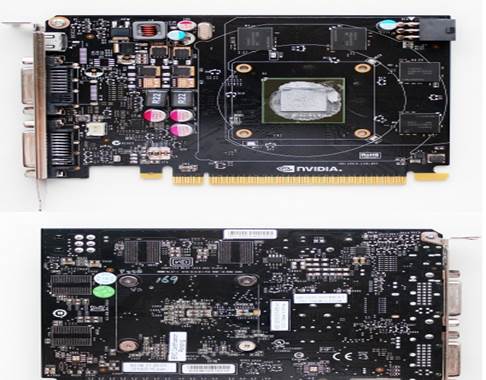
PCB
All memory chips are positioned at the
front face of the PCB although there are silver buffer for them at the rear. GPU
GK 106 doesn’t have any protective frame, so you need to be especially careful
when removing or fitting up the cooler into them. Our testing GPU is the A1 version
made in the 30th week of 2012.
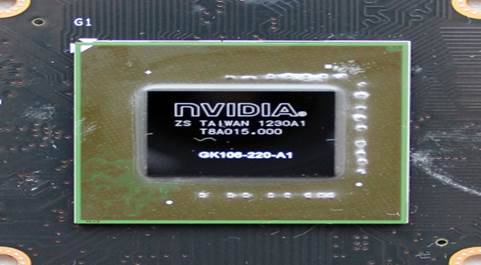
GPU
version A1
In contrast to the GK 106, which is mounted
on the GeForce GTX 660, GPU of GTX 650 Ti only has processors with 768-shader
capacity, 64 texture-mapping units and 16-raster scans (we want to tell you
that GPU of GTX 660 is 960/80/24). The clock rate of GPU is also lower. Instead
of the base and advanced frequencies of 980 and 1033 MHz, GPU works with the
speed of 928 MHz and doesn’t have any different advanced modes. This doesn’t
stop the graphics card manufacturers from releasing the pre-overclocked version
for these kinds of products, which we will see below.
GeForce GTX 650 Ti can come with a 1- or
2-GB GDDR5 memory. Our sample use the 1-GB memory in 4 FCBGA chips of Hynix
Semiconductor, which has the label of H5GQ2H24AFR R0C
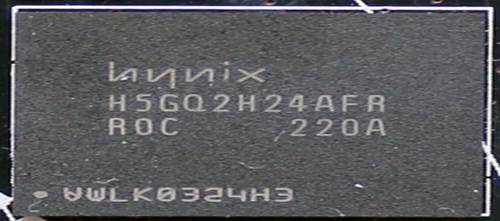
H5GQ2H24AFR
R0C Chip
That’s the fastest chip the Hynix offers
right after they clocked for the frequency of 6,000 MHz. however, the original GeForce
GTX 650 Ti has the memory frequency of 5,400 MHz. Accompanying with 128-bit bus,
this means that the memory bandwidth is 86.4 GB/s. not much compared to the current
standards, but in general, we are still doing research on the low-end graphics
card, after all.
Here is the summary of technical standards
of the original GeForce GTX 650 Ti:
The cooling system is extremely simple,
including an aluminum heatsink foil and a plastic cover, along with an 80-mm
fan.
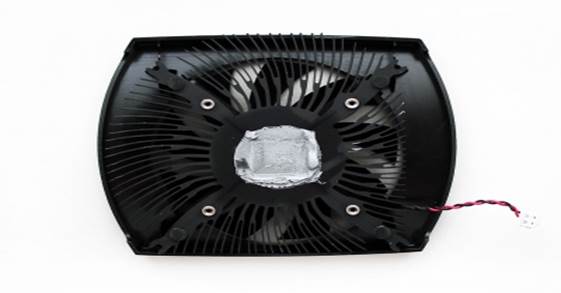
Cooling
system
To check thermal energy of the graphics
card in the review, we perform 5 consecutive tests with the Aliens vs Predator
(2010) game with highest image quality settings with 1,920x1,080- resolution
and 16x anisotropic filtering, 4x MSAA antialiasing. We use MSI Afterburner
2.3.0 and GPU-Z 0.6.6 as controlling tool. This test is performed in a closed
system with the room temperature at 230C. All thermal tests are
performed before we take the card apart, which means that with the default
platform still unchanged.
Let’s see how this simple cooler deals with
GeForce GTX 650 Ti when its fan is set at auto mode or max mode.
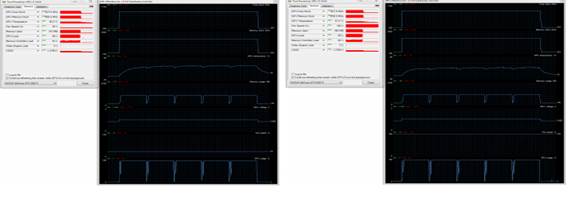
Auto
fan mode and max fan mode
The performance of the cooler is good enough
for its primitive design. GPU is only 650C hot at auto fan mode,
which means that the fan runs 26% speed. When the fan runs at full speed, GPU has
the temperature of 570C. The noise factor will be discussed later.
It’s interesting when we overclock the GeForce
GTX 650 Ti. By increasing the memory frequency step by step, we have reached
the frequency of 7,200 MHz (or +0.33%); meanwhile, GPU is still stable after we
increase its clock rate to 160 MHz (+17.2% compared to the default clock rate).
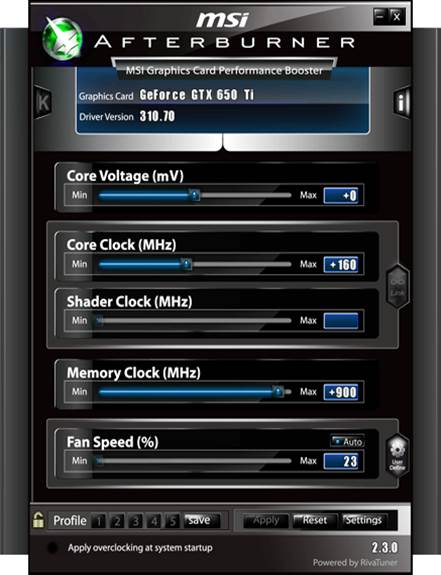
Overclocking
process as trial
The result above is amazing for such a
cheap-priced graphics card. Indeed, it’s the best combined result (GPU+ memory)
in this test session. The final clock rate of Nvidia GeForce GTX 650 Ti is
1088/7200 MHz:
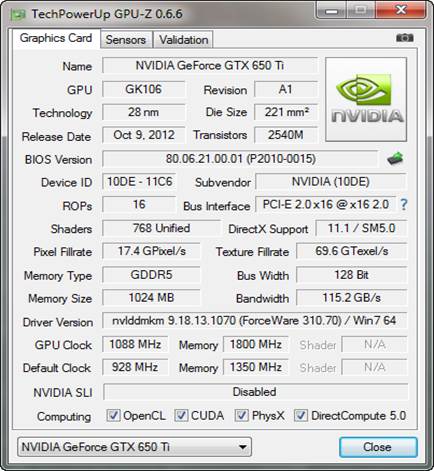
Overclocking
result
When overclocking, GPU is only 10C
hotter. Its temperature at the peak level is 680C:
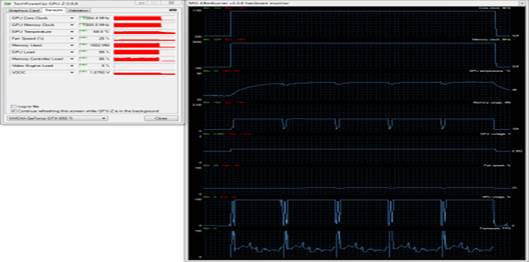
Overclocking
result
And the fan seems to rotate at the same
speed as it did before.
Nvidia GeForce GTX 650 Ti 1GB
technical specs
·
CUDA Cores: 768
·
Base Clock: 928 MHz
·
Texture Fill Rate (billion/sec): 59.2
·
Memory Clock: 5.4 Gbps
·
Standard Memory Configuration: 1,024 MB
·
Memory Interface: GDDR5
·
Memory Interface Width 128-bit
·
Memory Bandwidth (GB/sec): 86.4
·
OpenGL: 4.3
·
Bus Support: PCI Express 3.0
·
Certified for Windows 8: Yes
·
Supported Technologies: DirectX 11, PhysX, CUDA,
3D Vision, TXAA, FXAA, Adaptive VSync, NVIDIA Surround
·
3D Vision Ready: Yes
·
Multi Monitor: 4 Displays
·
Maximum Digital Resolution: 4,096x2,160
·
Maximum VGA Resolution: 2,048x1,536
·
HDCP: Yes
·
HDMI: Yes
·
Standard Display Connectors: One Dual Link
DVI-I, One Dual Link DVI-D, One Mini HDMI
·
Audio Input for HDMI: Internal